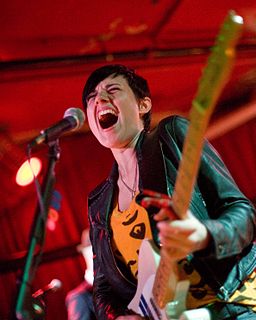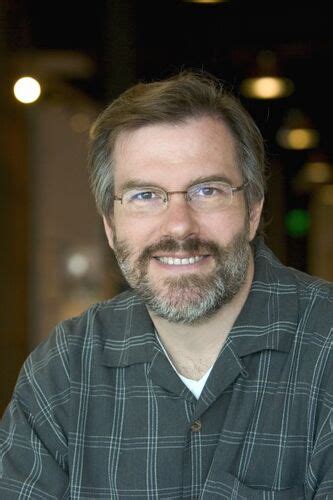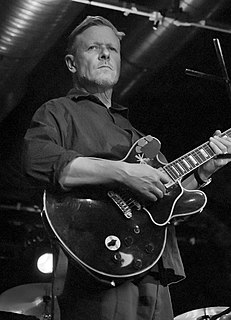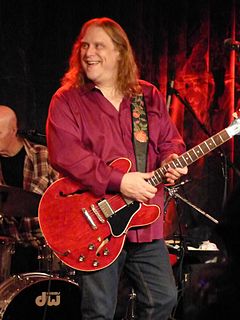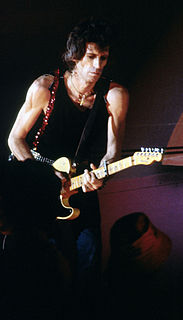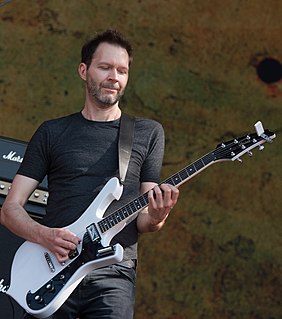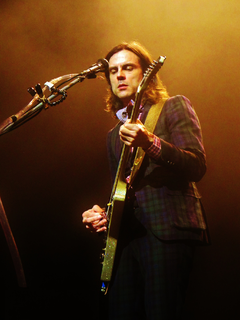A Quote by Lee Ranaldo
We're not playing your typical guitar tuning, so there is no normal chords for us to get our footing with. We're pretty much making it up as we go as far as the sounds we're creating. Oftentimes, the song will be inspired by just a certain kind of block of sound that somebody creates.
Related Quotes
I believe I love my guitar more than the others love theirs. For John and Paul, songwriting is pretty important and guitar playing is a means to an end. While they're making up new tunes I can thoroughly enjoy myself just doodling around with a guitar for a whole evening. I'm fascinated by new sounds I can get from different instruments I try out. I'm not sure that makes me particularly musical. Just call me a guitar fanatic instead, and I'll be satisfied.
I usually start with a guitar riff or some little pattern of chords, and then I kind of go from there. Usually my lyrics are the last thing to go onto a song. For years and years I only ever did instrumental, so I'm still trying to get confidant with my lyrics and find the right balance. I'll generally get inspired from the music. I'll have a guitar line, and then I'll have a melody line, and I hook the lyrics up to fit that rhythm. So, my lyrics to tend be very rhythmic as well. They work with the music rather than the music works around them.
It's just rock and roll. A lot of times we get criticized for it. A lot of music papers come out with: 'When are they going to stop playing these three chords?' If you believe you shouldn't play just three chords it's pretty silly on their part. To us, the simpler a song is, the better, 'cause it's more in line with what the person on the street is.
There's no excuse for having a mental or creative block in sound. You can just go out and collect things in the real world - they make the sound, not you. It's very restricting to always use a library for sound effects. It's much more interesting and freeing to go out and record new sounds because you never know what you're going to get.
I always liked the steel guitar. I also love the guys that play the bottleneck. But I could never do it; I never made it do what I want. So every time I would pick up the guitar, I'd shake my hand and trill it a bit. For some strange reason my ears would say to me that sounds similar to what those guys were doing. I can't pick up the guitar now without doing it. So that's how I got into making my sound. It was nothing pretty. Just trying to please myself. I heard that sound.
I like loud electric guitars because I like how you can just lose your entire being in the sound. But I can't find myself in a situation where our band Swans is doing typical chord progressions - it just seems cliché to me. Even changing chords sounds like a cliché sometimes, though it happens occasionally in our music. But you find ways to push yourself into the sound through repetition. It doesn't stay the same. It morphs constantly.
When that much time goes by, you're really listening to your old music differently. At the time it's written, it was the beginning of our career and with every song we're thinking, 'This is what's creating us.' Now, nothing is creating us. We're well-created. We're there. It becomes just pure pleasure and you become sort of an archeologist of your own music. You don't judge it, because what's the point? It's a 30-year-old song. It just becomes fun.
And if I'm ahead, I can sometimes tell. It might mean I'm having a good swim, but pretty much, I'm just focused on how fast I'm going, how fast I'm feeling, and pretty much block everything out, the sounds, the sights, just kind of listen to the rhythm of the water, and just maintaining the same stroke, the same rhythm, the same tempo, and thinking about how I want to get my hand to the wall.
There is a fragrance in the air, a certain passage of a song, an old photograph falling out from the pages of a book, the sound of somebody's voice in the hall that makes your heart leap and fills your eyes with tears. Who can say when or how it will be that something easters up out of the dimness to remind us of a time before we were born and after we will die?
It's the typical mid-life crisis kind of thing, where you just stop and wonder, 'Should I go back to university and get a law degree?' I kind of looked around me and thought, 'What kind of idiot am I that I've just spent the last 10 years writing novels? Financially, I'm pretty much where I was when I was 28.'



